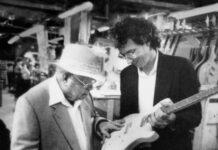
Lockdown Diaries: Joe Satriani
Had 2020 gone according to plan, Joe Satriani would be three months into a world tour in support of his recently released album, Shapeshifting. Like every other working musician in the world, however, Satch’s schedule thrown into disarray by the COVID-19 pandemic. “We were a week away from starting rehearsals,” Satch recalls. “I had the setlist drawn up, the guitars and equipment were ready to go – we were just about to push all the buttons. And just like that, we stopped. It was the strangest thing I’ve ever been through.” He lets out a chuckle, then adds, “Of course, who can’t say that these days?”
While other musicians have been forced to cancel tours outright, Satriani considers himself one of the lucky ones – his complete itinerary was simply moved a year ahead, with his first show slated for April 9, 2021, in Zurich, Switzerland. “I can’t tell you how good I feel to be given the chance to rebook everything exactly as it was,” he says. “All of the venues and promoters were on board with that. All of the dates are the same, just a year later.”
Since March, Satriani has holed up at his home in San Francisco, but lest anybody think that he’s been sitting around binging on Netflix, think again. “I’ve never been so busy,” he says. “In my studio room is this gigantic green screen, and later today, my wife Rubina and I will be filming for a music video that’s going to be edited by my son, Z.Z., down in L.A. Beyond that, there’s a lot of online activity. I’m doing interviews and live streams for Instagram and Facebook. It’s amazing what you can do at home.”
In addition, Satch has already turned his attention to not one, but two new albums he’s looking to record during the rest of 2020. “If this were a normal time, I wouldn’t start a new album till after I was done touring Shapeshifting,” he says. “But as I was eyeing a 12-month pause, I said, ‘Well, I may as well get creative and make some more music.’”
Joining Satriani on the recordings will be his live band – drummer Kenny Aronoff, bassist Bryan Beller and keyboardist/guitarist Rai Thistlethwayte, along with longtime studio musician Eric Caudieux. One disc will be a vocal-oriented set of tunes that will showcase Thistlethwayte’s singing chops, while the second will be an all-instrumental affair that Satch describes as “kind of way out. It’s not the antitheses to Shapeshifting, but an entirely different view of what I like to play and listen to. It removes some stylistic fences and broadens my writing scope a little bit. When Kenny heard some of the stuff, he said, ‘Man, this is like some weird version of Weather Report or something.’ I thought that was great.”
Before the pandemic, what was the highest number of shows that you ever had to cancel?
There’s only three times I can remember in my entire career. There was a snowstorm in Pittsburgh during The Extremist tour. Winter tours are always rough, but that storm was impossible. And then a few years after that, during the first SARS epidemic, we had to cancel a very short G3 tour of Asia. It wasn’t a popular decision. All of our partners in Asia were really upset with me for years, and it delayed us returning for a while – “That guy’s going to cancel on us again.”
And there was one other time when I came down with pneumonia right when we started a three-week post-Christmas tour. I remember I did one show at the Fillmore to kick it off, and I could barely get through it. The next morning I got an X-ray, and the doctor said, “Oh, my God. You’ve got to stay home for the next six weeks.” That was the only time I can remember having to cancel because I physically couldn’t play.
It must have felt strange to put out Shapeshifting while knowing you couldn’t tour behind it.
It must have felt strange to put out Shapeshifting while knowing you couldn’t tour behind it.
You know, I don’t live in a vacuum. There’s so many things going on in my life that accompany the making of an album, and everything is wrapped up in it. There are people I work with, and they all have lives, so nothing is ever cut and dry. I keep a perspective on things.
I knew that whenever this record came out, the music would be available forever and that allowed me to just exhale and say, “OK, timing doesn’t matter.” Certain things are in your control and you can have the best possible scenarios; other times, nothing is in your control. This just happened to be the latter. For me, the reality was there. Something is happening, it’s really bad, and we just have to deal with it. There was no way I was going to force a band and a crew to go on tour just because I was putting out a record.
Image: Rick Kern / GettyEven if you tried, would you have been able to?
Some countries refuse to say no. France hung on for the longest time. It was brutal for my French promoter. Until the very last moment, he kept telling us, “Don’t say you’re not coming.” Meanwhile, all the rest of the countries said, “Of course you’re not coming.”
What was it like when you were watching the news and realizing the decision you were going to have to make?
You have to understand, there is a big budgetary shift in my life when you reach the end of spending money on an album and you’re spending money on getting a tour just about ready to go. I mean, we’re talking close to $100,000 in travel fees that are already out of the account. But you’ve got to have nerves of steel for this business. It’s just the way it is.
In the beginning, when I made that phone call to everybody – to my managers first – and I said, “Look, we have to cancel. I’m not forcing anybody to go on tour and risk death just to promote an album. So let’s get real here”… you know, it’s a hard decision, but it’s not hard. I was talking to friends of mine in the medical community and getting projections about where this virus was going to peak in different parts of the world, which just so happened where we had booked our tour. Once everybody agreed that we shouldn’t be travelling, then we had to think about how to deal with all of our partners who, along with us, have invested an enormous amount of money to get us to put on shows.
We’re talking about renting venues. A lot of people don’t know this, but you can’t just show up and play wherever you want. You need a promoter. The promoter’s got to make a deal with the venue. You literally rent the venue for money, for one night or multiple nights or whatever. There’s a lot of business going on, and a lot of people are nervous until you sell all the tickets and the show happens. It’s a nail-biter right to the end of a tour.
And as it happened, this was the worst possible scenario, the absolute worst, because I had already spent the money to get everybody on planes and in hotels. We rented the buses – everything. And then I knew that my good friends, promoters that I’ve been with for decades, had already spent their money too, and they’d signed contracts. And in some countries, the venues refused to give the money back because they said, “There is no pandemic. Our government hasn’t said there’s a pandemic. So you’re going to owe me the money anyway.” That’s the money that they were going to get from the sale of tickets, but of course, you’ve got to refund the tickets. It was just a freaking nightmare.
Was it hard to break the news to the crew and the band?
Yes. Absolutely. Some people were a little bit more optimistic because of the information that they had available to them. I’ve got friends in my community circle here who are on the forefront of medical innovation and who work internationally with other doctors, so I was able to tap into this network of people. They were waving red flags like you wouldn’t believe. And then you’d turn on the television and people are still saying, “Hey, Disneyland’s still open.” You know?
It’s a hard thing for a lot of people, which I’m certainly aware of. There are guitar technicians, drum techs – they’re all out of work. It’s devastating for both local and travelling crews. Everyone who helps put on a show, they’re at home right now.
But at the end of the day, you’re the one with the name on the tickets. If someone dies, how would you sleep?
It’s not worth it. It never is. That’s exactly what I said back with SARS epidemic. I said to everybody, “Hey, do you really think that I’m going to sacrifice somebody in the band and crew just for rock ‘n’ roll? Come on.” You don’t even think for a microsecond about that. The decision is so obvious.
You’re very sane and philosophical about all of this. A lot of artists would have had an aneurism about the situation.
I just kept in my mind the most important things – the health and safety of the fans, the community, and then family. As you get closer and closer, you say, “Yeah, it’s important for me to stay alive too.”
And then you realize the other thing – it’s all about the music. We have the music, so why don’t why we release it? We promised our fans there would be a new album, and we’re not going to renege on that just because we’re worried about money. Business will work itself out. I’m so proud that we have this creative document called Shapeshifting, on which everybody who participated gave everything they had. So I thought, “This is a perfect gift to people who are stuck at home. Let’s give them some music that can help them sort of forget about the day-to-day mask-wearing, hand-washing, sanitizing, all of that.”
Even so, some labels might have said, “Let’s wait to put the record out.”
That never happened. Never. We spoke with Sony right away, and we had a really honest conversation about things. The big question was “What are we trying to achieve with this music?” And the answer, as always, was that we’re trying to reach our fans. We’re trying to bring music to people. So, with that in mind, we just thought, “Why stop?” The record was finished, mixed and mastered. We were good to go.
Actually, from a creative standpoint, my attitude was, “I need to put it out because I’m going to be such a different person next year.” That’s just the way I am. Once I finish an album, I just want to move on. I can’t help it. I’m an artist. I make things, I put them out, and then I go on my way.
Image:Tim Mosenfelder / GettyAnd that’s exactly what you’re doing – two new records at once.
That’s right. We haven’t really nailed down the style yet for the vocal album, but we’re 10 to 11 songs in on the instrumental record. I’m very excited about it because the song structures are so different. Shapeshifting had more of a solid rock attitude. It was kind of classic sounding – the grooves, the guitar way upfront. On this one, I’m using more unusual chord shapes and key changes, and I’m doing different kinds of grooves. It’ll give everyone a lot of space to improvise and expand. And that means longer pieces, and I think less nods to rock radio.
Are you going to be doing remote recording, or are these sort of elaborate demos for when you can all get in a studio?
We’re going to record remotely, because I have a feeling that Rai and I will have our parts sort of finished in a month or two. He’s in Sydney and I’m here in San Francisco. The guys who are down in Southern California – Kenny, Bryan and Eric – can actually get together if they really have to.
This is very different from how you usually record. Usually, you’re in the room with everybody and you’re making all the decisions. With remote recording, you might be surprised by what everybody sends you.
Yeah, and that’s great. Shapeshifting is probably the perfect document to represent the way I usually make an album – I go in, and I’m there collaborating with people, but I’m the one making all the main decisions. This time I made the conscious decision that this should be a band record – or band records. The music will reflect everybody, not just me. I’m not really sure how we’re going to release the records, but I’m excited to know that we’re going to have so much new music when we can finally hit the road.
Image: Christie Goodwin / GettyAny thoughts as to what touring will look like in 2021?
My feeling is that there will be a vaccine by then; also, I think people will figure out how to get fans to events. I don’t think that’s a really difficult issue. The difficult issue is the performers and the technicians. We’re still stuck in a completely non-conforming situation, meaning we can’t do what we normally do and conform to recommendations from CDC and WHO and everybody else giving us guidelines about how we can or can’t work together. Musicians and technicians need to get on tour buses and aeroplanes every single day, and then we’ve got a crowd backstage and we work in crowded conditions. I mean, come on – how do you work with your guitar tech and be six feet away?
Have you talked to some guitar player friends, all of whom are sidelined? How are they handling this?
Some of my friends are very much like me. Steve Vai is a good example. He and I were talking about how this whole thing isn’t very unusual for us because we like to crawl into our caves with our guitars and work on music. We haven’t changed since we were kids, really. My musician friends who are in big, successful bands have got money put away for the rainy day. Their organizations are saying, “OK, in 2021 and 2022, we’ll conquer the world with stadiums and things.” So they’re not too worried.
On the other hand, there are friends of mine who depend on playing five clubs a week to make rent, and this has been really difficult for them. I know people who play parties and events, and it’s really hard watching them struggle. This has stopped them in their tracks – they can’t play. And I have friends who own music stores, and this has been crazy for them, too. We’re all talking to each other – “What did you hear from the government about PPE?” All these new phrases have crept into our conversations. We’ll see how everything turns out. But in the meantime, everybody just has to be safe.
For more interviews, click here.
The post Lockdown Diaries: Joe Satriani appeared first on Guitar.com | All Things Guitar.
Source: www.guitar-bass.net











